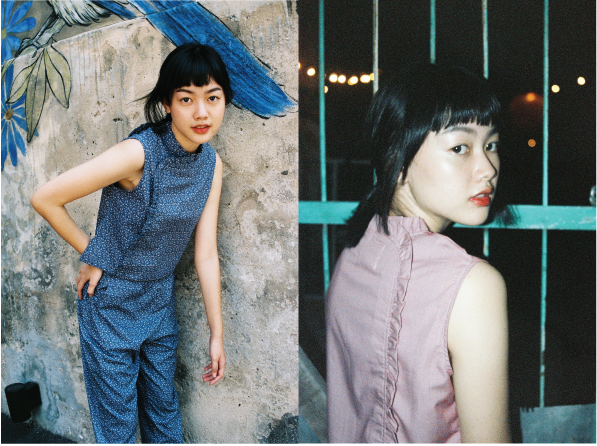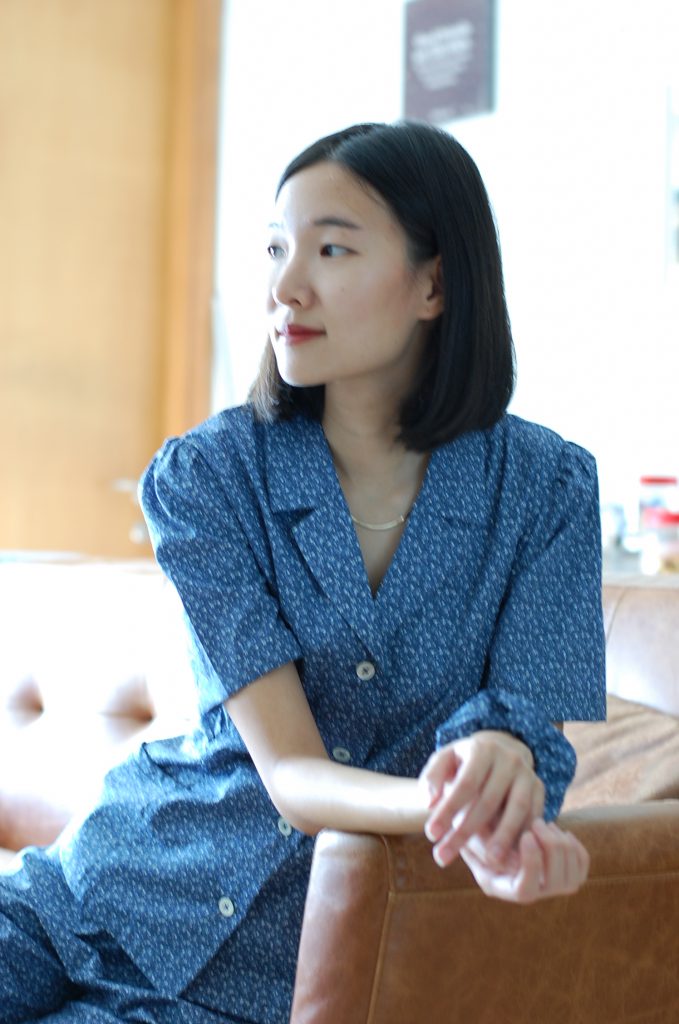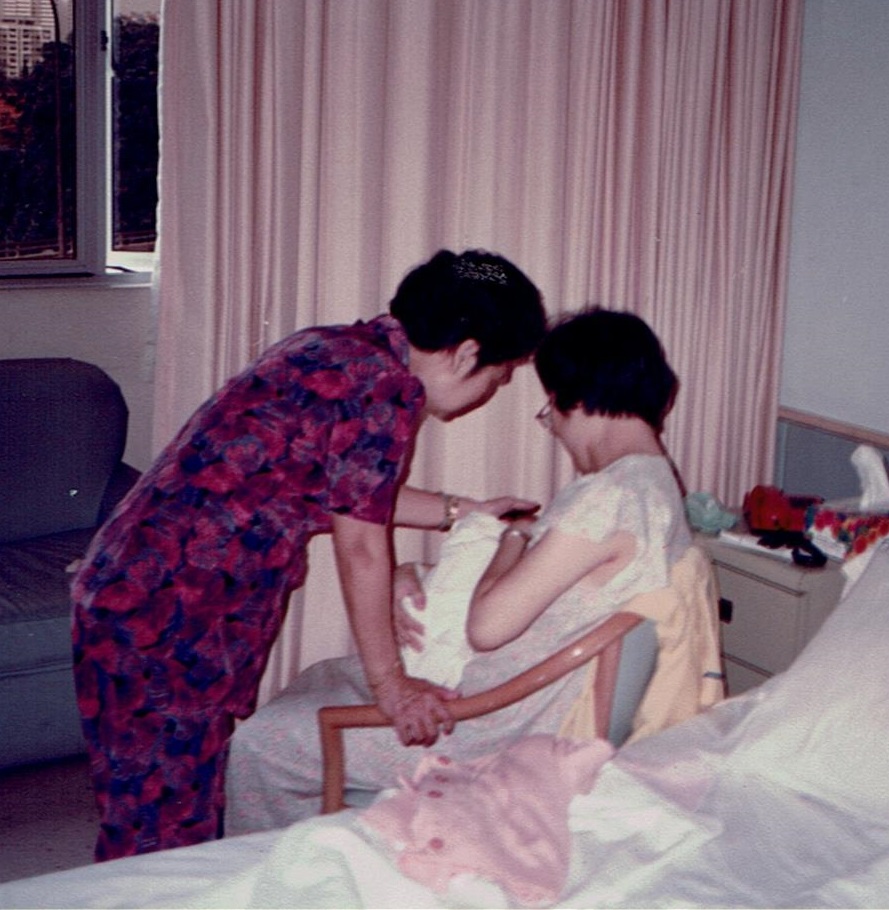Twenty-seven-year-old Trixie Chua dresses like most hip millennials do today – mom jeans and basic tees for sustainability with a dash of style. But with old becoming the new cool and grandma dressing even trending earlier this year, she’s inspired to bring back her grandma’s fashion in her own label, Dear Samfu.

Photo Credit: Dear Samfu
This homegrown sustainable fashion label is known for its collections of samfus [Cantonese: 衫裤], a breezy top and trouser pair usually made of the same fabric, ranging from silk to cotton. The top (sam 衫) is secured with studs or loops while the bottoms (fu 裤) are waistband trousers.
Trixie got her inspiration for Dear Samfu from her grandmother’s wardrobe during a visit to her house. Many women like her grandma wear their samfus for decades and rarely splurge on new clothes.
“Just like our grandmothers in the past, we should love our clothes till they’re totally worn out,” says Trixie.

Photo Credit: Trixie Chua
“[It’s] the same clothing they had from when they were young,” says Trixie.
She felt that it was something young people should “aspire to achieve”, in terms of “the things we wear, how we choose our clothes wisely”.
Inspiration Behind The Brand

Photo Credit: Trixie Chua
Trixie is unsure if her grandmother fully understands her business initiative. However, she expresses excitement towards it.
“When I showed [the samfus] to her, it actually looked like what she wore so she’s pretty excited about that…She also excitedly asked me to open her wardrobe to see her samfu collection.”
The marketing staff of an e-commerce company runs the brand as a side hustle. Always wanting to start a business and create something useful, Trixie believed that it was finally time to translate her ideas to “something credible” and turned her samfu designs to life.
More free time during the circuit breaker spurred her to take the leap of faith in May for her first launch. “Everyone [was] all going online and it was a great time to enter via the online space,” she says.
Starting out, she wasn’t worried about the receptiveness of the business but more of the awareness surrounding what the samfu is. According to Trixie, her friends knew that samfus were worn by grandmothers and aunties but didn’t know the proper term for it.
Her current customers are mostly in their 20s to 30s. Despite the brand only being only a few months old, it has sparked interest overseas, especially to foreigners of Asian descent who “can relate to this story” and culture.
Trixie says that the samfu is “versatile” and the organic cotton fabric of the samfu also takes Singapore’s hot and humid climate into consideration.
She had put much thought into the initial process of ensuring that each product stood by the brand’s sustainable and fair practices. Initially, one of the bigger struggles that she faced was sourcing for a suitable supplier that also shared her beliefs.
“I didn’t have a background in fashion design, so a lot of things I was learning along the way.”
She researched online and found partners and manufacturers in Thailand to work on her designs. Deadstock materials from bigger brands are used to make the samfus by a family-run factory that ensures ethical standards and payment of living wages.

Photo Credit: Dear Samfu
Solely corresponding online due to Covid-19, she has yet to meet her business partners. Communicating via calls included having to plan and perfect the fit and design of the samfu all online before being able to make it in even larger quantities.
One of the sustainable practices the brand follows is producing in small quantities to prevent the problem of waste. In 2019, Singapore generated more than 168,000 tonnes of textile and leather waste, equivalent to about 11,563 double decker buses. However, only 4% of such waste was recycled, according to data from the National Environment Agency.
“I make [them] in small quantities. We have to test the markets first so we don’t create more waste if we overproduce.”
With smaller quantities, however, production cost per piece will go up. Using sustainably sourced materials and paying workers fair wages also add to the cost.
Each piece of clothing from Dear Samfu costs $85 to $99, relatively more expensive than what one would see on the racks of a fast fashion brand. Trixie acknowledges this.
She doesn’t want to charge consumers simply based on a price mark-up but what they’re willing to pay for her clothing. “There’s a very fine balance between value-based pricing and markup pricing,” she says.
She explains that she has to put the customers first by trying to price the items affordably but it also has to cover the overall cost to make sure it’s “still a viable business to run”.
It’s Not Expensive to Dress Sustainably
Despite this, Trixie believes that one of the biggest misconceptions people have about wearing sustainable fashion is that it is expensive.
“Apart from choosing from sustainable brands like Dear Samfu, there’s also secondhand shops, thrift shops, there’s also Carousell… [Find] alternatives of different ranges of prices depending on your comfort level.”
She says that the first step for people who are trying to be sustainable in their fashion choices is to think about “the mileage that [they] can get out of the clothing”. Think about the number of times they can wear it or decide if they want it simply because it is a current trend.
Her personal fashion staples are her mom jeans and basic tees as they “go well with everything”.
Trixie’s personal goal is for more people, especially young women, “to understand the importance of making wise fashion choices and really consider sustainable alternatives” by educating them through Dear Samfu.
As for Dear Samfu’s future plans, Trixie feels that “going international is the way to go”. She sees the brand expanding in terms of designs but hopes to stick with inspiration from her grandmother’s generation.
Edited by Christel Yan
Proofread by Coen Sim
